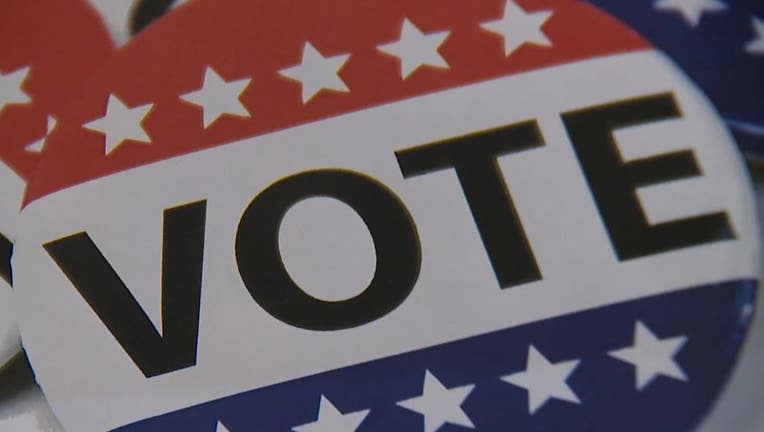Wisconsin Primary Election: Battle for secretary of state takes shape

MADISON, Wis. - Longtime Wisconsin Secretary of State Doug La Follette won his Democratic primary on Tuesday, advancing to a general election in which Republicans hope to win back the seat and give it power over elections.
Unlike many states, the Wisconsin secretary of state is not the top elections official and the office’s only duties are to sit on a state timber board and verify certain travel documents. But Republicans seeking the job want to change that and dismantle the Wisconsin Elections Commission, an agency established just six years ago by GOP state lawmakers with bipartisan support.
All three GOP candidates on Tuesday’s ballot have echoed former President Donald Trump’s false claims that fraud cost him the 2020 election and have sharply criticized decisions made by the commission heading into the 2020 election, when the COVID-19 pandemic brought major challenges to running elections. They argue that empowering the secretary of state would allow voters to hold someone accountable for important election-related decisions.
To accomplish their goal, Republicans also would need to defeat Democratic Gov. Tony Evers, who would block such a move, in November.
SIGN UP TODAY: Get daily headlines, breaking news emails from FOX6 News
The Republicans vying for the nomination were state Rep. Amy Loudenbeck, businessman Jay Schroeder and Justin Schmidtka, who hosts a political podcast.
Primaries were also held Tuesday in Minnesota, Connecticut and Vermont. In Minnesota, Secretary of State Steve Simon easily won his Democratic primary.
This year, races for secretary of state have drawn tremendous interest and money largely because of the 2020 election, when voting systems and processes came under attack by Trump and his supporters. There is no evidence of widespread fraud or manipulation of voting systems occurring in the 2020 election.
La Follette, 81, was first elected secretary of state in 1974. On Tuesday, he said he didn’t think primary voters were focused on the issue of who runs elections, but they will be.
"That’s what the election is all about now, " La Follette said in a telephone interview. "My message is simple and very clear: I think we in Wisconsin want to keep partisan politics out of the election process the way we have for 50 years."
At a polling location in Ozaukee County's Thiensville, Wisconsin GOP primary voter Franklin Szpot, 42, who works in marketing and sales, said he felt more confident in elections this year.
"I think it’s secure right now. I’m hoping that there isn’t any nonsense that happens," Szpot said. "After Trump lost, I had lost a lot of faith in that, and now I feel it’s kind of coming back with some of these candidates that are on the ballot."
Peter Giersch, 55, a business owner who also voted in the Republican primary, said he was hoping for the best.
"It would be foolish to say there’s absolutely no fraud and foolish to say they’re not trustworthy at all," Giersch said. "It’s probably somewhere in the middle."
In Minnesota, the leading Republican candidate has called the 2020 election "rigged" and has faced criticism for a video attacking three prominent Jewish Democrats, including Simon, the current secretary of state.
Kim Crockett has also called the 2020 election a "train wreck" and accused state election officials of using the pandemic as "cover to change how we vote, but also how the vote is counted." In early results, Crockett was leading her GOP primary opponent, Erik van Mechelen.
Indira Neill, 36, of Moorhead, Minnesota, said after casting her primary ballot Tuesday that she was more concerned about voters being manipulated than ballots being miscounted.
"My greater concern is generally things like disinformation campaigns and the spread of disinformation through social media," said Neill, a college professor who supported Simon. "We know this happened in the 2016 election, and there is no reason to believe these campaigns have stopped."
Races in Connecticut and Vermont were noteworthy because it was the first time in more than a decade that the seats were open. Both longtime Democratic secretaries of state opted not to seek reelection this year.
In Connecticut, GOP primary voters selected Dominic Rapini and Democratic primary voters nominated state Rep. Stephanie Thomas. Rapini is the former board chairman of a group called Fight Voter Fraud Inc. and has called for tightening ID requirements and cleaning the state’s voter rolls. Thomas opposes additional ID requirements.
"I would like to appeal right now — today — and to all unaffiliated voters, Republican voters who are looking for an alternative to conspiracy theories and the sowing of misinformation, who believe that it’s time to invest in our democracy and make sure that we have the infrastructure to run clean elections," Thomas said in a speech Tuesday night.
William Simmons, 75, a retired school principal who recently moved from New York to Hartford, Connecticut, said he believes that the claims pushed by Trump and embraced by some secretary of state candidates across the country are "a bunch of baloney." He said he's confident that elections in Connecticut will be fine.
"I think people are fair and honest, and I’m not worried about my vote here," Simmons said, adding it doesn’t matter to him whether a Democrat or Republican wins in November as long as it is someone who is "fair and honest and has good morals."
In Vermont, the Democratic primary has drawn the most interest. The candidates were Deputy Secretary of State Chris Winters, state Rep. Sarah Copeland Hanzas, and Montpelier City Clerk John Odum.
A perennial candidate for office, H. Brooke Paige, was the lone person running in the GOP primary. He also appeared on the ballot for three other statewide offices.

